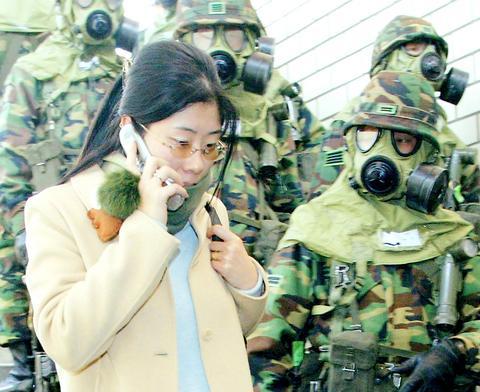The South Korean government said yesterday it would crack down on political unrest as financial markets brushed off fears of instability to bounce back on the first working day following the impeachment of President Roh Moo-hyun.
Candlelight protests that drew tens of thousands of people to the streets of Seoul for the past two nights were outlawed as interim leader, Prime Minister Goh Kun, pledged to restore stability to the economy, guarantee security and oversee the run-up to crucial April 15 general elections.

PHOTO: AP
Any political unrest would be harshly dealt with, the government warned.
"Any moves or rallies that cause social disorder will be strictly dealt with in accordance with laws and principle," a government statement said.
Earlier, police outlawed candlelight rallies that drew some 100,000 people to the streets of Seoul over the weekend.
"Evening candlelight rallies in the street are illegal," said senior police superintendent Kim Ok-jeon, in charge of security in Seoul.
"According to the law, we will use force to disperse rallies if participants pay no heed to repeated warnings to disperse," Kim said.
Goh, 66, said he would ensure government neutrality in the run-up to next month's election.
"With just 30 days to go before the elections, we face a difficult political situation," Goh said following a Cabinet meeting. "The government must maintain its neutrality for fair elections."
Roh's impeachment polarized politics and inflamed passions here and protesters said they planned daily demonstrations in the run-up to next month's vote.
North Korea condemned the National Assembly vote to unseat Roh and pulled out of inter-Korean economic talks scheduled to start yesterday in South Korea after demanding a change of venue, citing political unrest sparked by the
impeachment.
The South's Unification Ministry accused the North of seeking to exploit its problems and has expressed regret in a letter sent to Pyongyang.
North Korea termed the impeachment a political rebellion against the wishes of tens of millions of South Korean people and said the US was behind the move.
Goh has already put South Korea's 700,000-strong military on heightened alert to counter Pyong-yang, engaged in a 13-month nuclear standoff which is considered a major threat to world peace.
Washington has declined to comment on the impeachment saga, saying the matter was South Korea's internal affair.
Finance Minister Lee Hun-jae has attempted to reassure the markets and international investors that political instability will not trouble the tentative economic recovery in Asia's fourth largest economy.
The two main opposition parties, the Grand National Party and the Millennium Democratic Party, joined forces to impeach Roh last Friday after he was reprimanded by a government watchdog for illegal electioneering before general elections scheduled for April 15.
More than 70 percent of South Koreans opposed impeachment, according to opinion polls.
Roh was suspended from office following the vote and Goh took over as interim president. The case is under review by the Constitutional Court which will rule within 180 days whether to uphold the vote or restore Roh to power.

Kehinde Sanni spends his days smoothing out dents and repainting scratched bumpers in a modest autobody shop in Lagos. He has never left Nigeria, yet he speaks glowingly of Burkina Faso military leader Ibrahim Traore. “Nigeria needs someone like Ibrahim Traore of Burkina Faso. He is doing well for his country,” Sanni said. His admiration is shaped by a steady stream of viral videos, memes and social media posts — many misleading or outright false — portraying Traore as a fearless reformer who defied Western powers and reclaimed his country’s dignity. The Burkinabe strongman swept into power following a coup in September 2022

‘FRAGMENTING’: British politics have for a long time been dominated by the Labor Party and the Tories, but polls suggest that Reform now poses a significant challenge Hard-right upstarts Reform UK snatched a parliamentary seat from British Prime Minister Keir Starmer’s Labor Party yesterday in local elections that dealt a blow to the UK’s two establishment parties. Reform, led by anti-immigrant firebrand Nigel Farage, won the by-election in Runcorn and Helsby in northwest England by just six votes, as it picked up gains in other localities, including one mayoralty. The group’s strong showing continues momentum it built up at last year’s general election and appears to confirm a trend that the UK is entering an era of multi-party politics. “For the movement, for the party it’s a very, very big

ENTERTAINMENT: Rio officials have a history of organizing massive concerts on Copacabana Beach, with Madonna’s show drawing about 1.6 million fans last year Lady Gaga on Saturday night gave a free concert in front of 2 million fans who poured onto Copacabana Beach in Rio de Janeiro for the biggest show of her career. “Tonight, we’re making history... Thank you for making history with me,” Lady Gaga told a screaming crowd. The Mother Monster, as she is known, started the show at about 10:10pm local time with her 2011 song Bloody Mary. Cries of joy rose from the tightly packed fans who sang and danced shoulder-to-shoulder on the vast stretch of sand. Concert organizers said 2.1 million people attended the show. Lady Gaga

SUPPORT: The Australian prime minister promised to back Kyiv against Russia’s invasion, saying: ‘That’s my government’s position. It was yesterday. It still is’ Left-leaning Australian Prime Minister Anthony Albanese yesterday basked in his landslide election win, promising a “disciplined, orderly” government to confront cost-of-living pain and tariff turmoil. People clapped as the 62-year-old and his fiancee, Jodie Haydon, who visited his old inner Sydney haunt, Cafe Italia, surrounded by a crowd of jostling photographers and journalists. Albanese’s Labor Party is on course to win at least 83 seats in the 150-member parliament, partial results showed. Opposition leader Peter Dutton’s conservative Liberal-National coalition had just 38 seats, and other parties 12. Another 17 seats were still in doubt. “We will be a disciplined, orderly